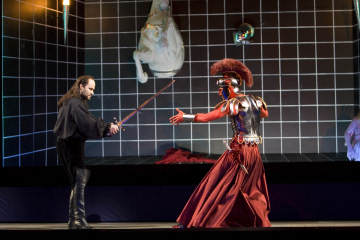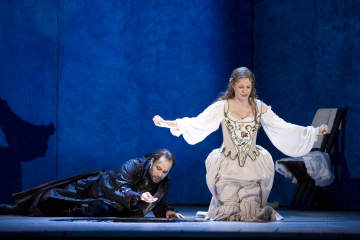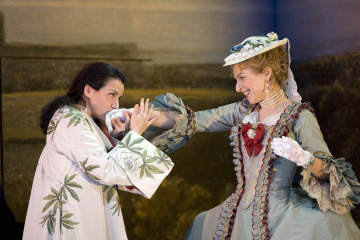|
Editorial Board
Melanie Eskenazi Webmaster:
Bill
Kenny
|
Seen and Heard Opera Review
Handel, Orlando: Soloists, Orchestra of the Age of Enlightenment, cond. Charles Mackerras Royal Opera House, Covent Garden, 26.02.2007 (ME)
What, no cocaine? No supposedly ‘glitzy’ gloss on the mores of the age? No sluts, slobs, yobs or gobs? No crotch - scratching, balls – squeezing or quick flashing? No – just an entirely appropriate 18th century set for an opera first performed in 1733, using the iconography of the centuries-old legend of Orlando to illuminate a tale of the conflicts between passion and reason, and love and war: beautifully lit, authentically sung and played, and minimally directed so as to let the music speak for itself. And speak it did, despite cast changes from Francesco Negrin’s original 2003 production not being quite so ideal as the first ensemble.
The story of the ‘furioso’ hero, temperamentally ill suited to the constraints of the rational world, provides a perfect role for the counter-tenor Bejun Mehta, who made an unscheduled debut in this role in 2003, when Alice Coote had to withdraw. He is a winning stage presence with a lovely, if small, voice, and he produced plenty of vocal fireworks in ‘Fammi combattere’ as well as managing to scale down the tone for the delicate ‘Già l’ebro mio ciglio,’ during which the stage picture – the Dutch ‘perspective box’ within which much of the ‘rational’ action takes place, gradually fading from view as the curtains close in imitation of the eyelids – continues to enchant. Mehta was a great hit with the audience in the more showy parts of his arias, but he needs to take care not to push the voice too hard, as some of those top notes sounded a little fragile.
The other familiar presence from 2003 was the gorgeous Camilla Tilling, whose impersonation of the sometimes irritating shepherdess Dorinda was as charming and sweetly sung as could be desired: the voice is even and secure throughout the compass, and used with an affectingly warm tone in arias like ‘Quando spieghi i tuoi tormenti.’ I was less impressed with the Medoro of Anna Bonitatibus: William Towers, who sang the part last time, is a hard act to follow, and it does seem to me that the role is better given to a counter-tenor, since the mezzo’s gently rounded tone and frame did not create an entirely credible young lover.
Rosemary Joshua had an equally tough task in following after Barbara Bonney, and whilst she did not quite have the latter’s presence or her silvery tone, she was an engaging Angelica, most obviously in the duets with Medoro and Orlando, and in her beautifully phrased final aria. Kyle Ketelsen scored a remarkable hit as Zoroastro: I have taken an interest in the career of this young American bass-baritone since being mightily impressed with his Speaker in 2004, and he does not disappoint: a real Handelian basso, he caught just the right note of portentousness in his opening aria, and he presided over Act 3, both vocally and dramatically, with unaffected skill.
As before, the frail humans are watched over by the trio of Eros (David Lucas) Venus (Suzanne McNaughton) and Mars (Nicholas Cass-Beggs) whose dancing and gestures were a constant joy in their subtlety and appropriateness. Those qualities were also apparent in the orchestra, which responded faithfully to Mackerras’ typical desire for an intimate, polished, yet vibrant reading of the music. The wonderful Viole d’Amore (Catherine Mackintosh and Henrietta Wayne) deserve special mention.
The production has lost none of its relevance to the work, with the images from Raphael (the faraway towers, the stricken knight) and Botticelli (Mars and Venus) beautifully contrasted with the sparse lines of the perspective box, and the use of colour, especially the vibrant blue, softening the black and white of the central square. Wolfgang Göbbel’s lighting was particularly evocative, with singers being subtly highlighted against their background and the different ‘rooms’ beautifully illuminated according to the emotional tone of the character’s crisis at that moment. You will of course be disappointed with this production if you really must have heroin with your heroines and airheads with your arias, but if you’d like a break from all that, then you could hardly do better than this Orlando.
Melanie Eskenazi
Pictures © Bill Cooper
Back to the Top Back to the Index Page |
| ||
|
||||





